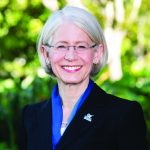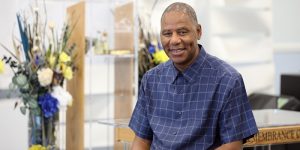
At Palm Beach Atlantic University (PBA), our hearts were broken as we learned of the senseless killing of George Floyd, Ahmaud Arbery and others like them, and we’ve been asking ourselves some tough questions in response. I invite you to join me in those questions, led by verses from Psalm 139.
“You created my inmost being,” wrote King David; “you knit me together in my mother’s womb. I praise you because I am fearfully and wonderfully made; your works are wonderful, I know that full well.”
Consider Ahmaud Arbery in Georgia, fatally shot while jogging. A work of God’s hand, fearfully and wonderfully made. Lovingly knit together in his mother’s womb, then needlessly slain at the age of 25. How God’s heart must have ached to see His wondrous handiwork destroyed!
Many from the PBA community gathered for a prayer vigil after Ahmaud’s death. They prayed for Ahmaud’s family, and they prayed, “Enable us to see the reality of racism and free us to challenge and uproot it from our society, our world and ourselves.”
The reality of racism
That prayer intensified in May after George Floyd was killed, and the prayer continues today. I am struck by the levels of application the prayer calls for: that God would help us see the reality of racism and uproot it “from our society, our world and ourselves.”
Ourselves? Who? Me? Surely not me, Lord. Is there any racism in my heart?
The question sends me back to Psalm 139, which concludes:
23 Search me, God, and know my heart;test me and know my anxious thoughts. 24 See if there is any offensive way in me, and lead me in the way everlasting.
God answers that prayer, and I must acknowledge offensive ways within my heart. I must confess those offenses, repent of them and take appropriate action. But what about other layers of application? What about my church? If there are few black and brown members of my church, are there offensive ways there that we must correct?
May God forgive us for what we have done, and what we have left undone.
And what about other areas within our sphere of influence? And what about Palm Beach Atlantic University?
Questioning calls for action

Long before tragic events of 2020 led to vigils and protests throughout the nation, Palm Beach Atlantic University leaders, students and alumni were opening dialogue and pointing to the biblical mandate for racial reconciliation and justice. But the shocking deaths of George Floyd and Ahmaud Arbery have moved us to ask deeper questions, calling for responses of concrete action.
We certainly don’t have all of the answers here at PBA but, as a Christian university, we are committed to Christ-centered unity and the expression of our culturally rich diversity on our campus and throughout South Florida. As we listen and seek to better understand the authentic and very real concerns of our growing PBA community, we remain steadfast to do all that we can to provide a safe and positive campus environment for all. And we’ve opened a new and structured way to search hearts, our programs and our policies.
In early August the University established the position of Fellow for Race and Ethnic Equity, a post that will be appointed annually. Dr. Terriel Byrd, professor of Urban Christian Ministry and coordinator of the evening ministry program, was the unanimous choice as the first person to fill this significant role.
Dr. Byrd, a scholar in the life and work of the Rev. Martin Luther King Jr., teaches the course Urban Justice Issues, among other courses within the School of Ministry. Recently the University established an educational fund for students of color named in his honor, the Dr. Terriel Byrd Scholarship.
A new task force
As the Fellow for Race and Ethnic Equity, Terriel will assemble a diverse task force including students, faculty and staff. That group will gather information to help develop a thoughtfully considered plan to foster a cultural climate of love and respect through tangible efforts and initiatives leading to greater equity and justice for all at Palm Beach Atlantic.
As a Christ-first institution of higher education, the University seeks to be intentional and systematic in its efforts to embrace and advance principles of inclusion in faculty/staff/student recruitment and retention, as well as in the design of curricular and co-curricular programs. In so doing, we follow the clear biblical principle of our oneness in Jesus Christ, which bridges all barriers of race, gender or cultural differences.
There is much work to do. And as we pursue new programs and initiatives, we recognize that authentic change ultimately comes through a heart change. And that change happens through Jesus.
As God leads us in all these efforts, we expect an even greater richness to develop within the special bonds of the PBA family. We’re excited about the days and years ahead, as graduates of Palm Beach Atlantic go out into the world with an even more powerful yearning and training to make a positive difference in their communities and in the world. Isn’t that what being the salt of the earth is all about?
Dr. Debra A. Schwinn is president of Palm Beach Atlantic University (www.pba.edu). A physician, researcher and innovator, she began her role as university president on May 4, 2020. For more articles by Dr. Schwinn, visit goodnewsfl.org/author/dr-debra-a-schwinn/


Comments